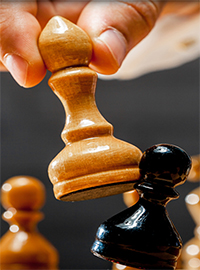| The Dumbest Idea |
 |
|
By Thomas Sowell
Tuesday, July 19 2016 |
If there were a contest for the most stupid idea in politics, my choice would be the assumption that people would be evenly or randomly distributed in incomes, institutions, occupations or awards, in the absence of somebody doing somebody wrong. Political crusades, bureaucratic empires and lucrative personal careers as grievance mongers have been built on the foundation of that assumption, which is almost never tested against any facts. A recent article in the New York Times saw as a problem the fact that females are greatly under-represented among the highest rated chess players. Innumerable articles, TV stories and political outcries have been based on an "under-representation" of women in Silicon Valley, seen as a problem that needs to be solved. Are there girls out there dying to play chess, who find the doors slammed shut in their faces? Are there women with Ph.D.s in computer science from M.I.T. and Cal Tech who get turned away when they apply for jobs in Silicon Valley? Are girls and boys not allowed to have different interests? If girls had the same interest in chess as boys had, but were banned from chess clubs, that would be something very different from their not choosing to play chess as often as boys do. As for chess ratings, that is not subjective. It is based on which players, with which ratings, you have won against and lost to. Are women and men not to be allowed to make different decisions as to how they choose to spend their time and live their lives? Chess is not the only endeavor which can take a huge chunk of time out of your life, and unremitting efforts, to reach the top. If you want to become a top scientist, a partner in a big law firm or a top executive in a major corporation, you are very unlikely to do it working from 9 to 5, or taking a few years off, here and there, to have children and raise them. Applying the same unsubstantiated assumption to differences in "representation" between different racial and ethnic groups likewise produces many loudly expressed grievances, political crusades, and millions of dollars from lawsuits charging discrimination — all without a speck of evidence beyond numbers that do not match the prevailing assumptions. People who base their conclusions on hard facts often reach very different conclusions than those who base their conclusions on the preconception that outcomes would be even or random in the absence of somebody treating somebody wrong. Something as simple as age differences among groups can doom any assumption of even or random outcomes. If every 20-year-old Puerto Rican in the United States had an income identical with the income of every 20-year-old Japanese American — and identical incomes at every other age — Japanese Americans as a group would still have a higher average income than Puerto Ricans in the United States. That is because the median age of Japanese Americans is more than 20 years older. People with 20 years more work experience usually make higher incomes. And age difference is just one of many differences between groups. You can study innumerable groups in countries around the world today, or over centuries of recorded history, without finding a single example of the even or random outcomes that are used as a benchmark for determining discrimination. Nevertheless, courts of law — including the Supreme Court of the United States — use something that has never been found anywhere as a norm to which current realities are to be compared. Billions of dollars, in the aggregate, have changed hands as a result of individual lawsuits charging discrimination. Life is undoubtedly unfair. But that is not the same as saying that the unfairness occurred wherever the statistics were collected. The origins of this unfairness often go back to different childhood environments for individuals or different geographic or cultural settings for groups and nations. These differences between nations, as well as differences between individuals and groups, reflect the fact that the world "has never been a level playing field," as economic historian David S. Landes put it. Renowned historian Fernand Braudel said, "In no society have all regions and all parts of the population developed equally." How long will we continue to take something that has never happened, and never had much chance of happening, as a norm? ---------------------------------------------------------------------------------------------------------------------------------------- Thomas Sowell is a senior fellow at the Hoover Institution, Stanford University. |
Related Articles : |
























